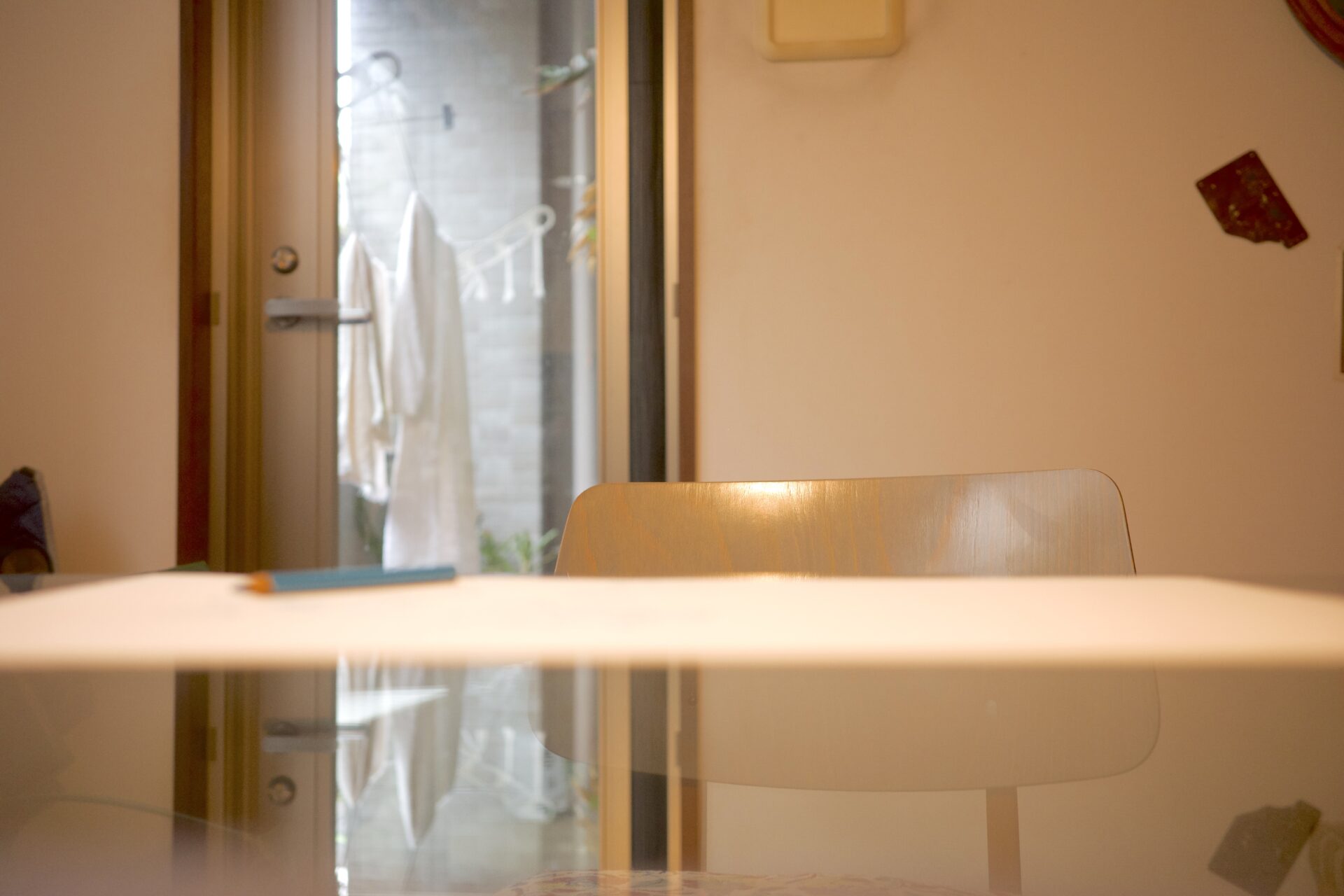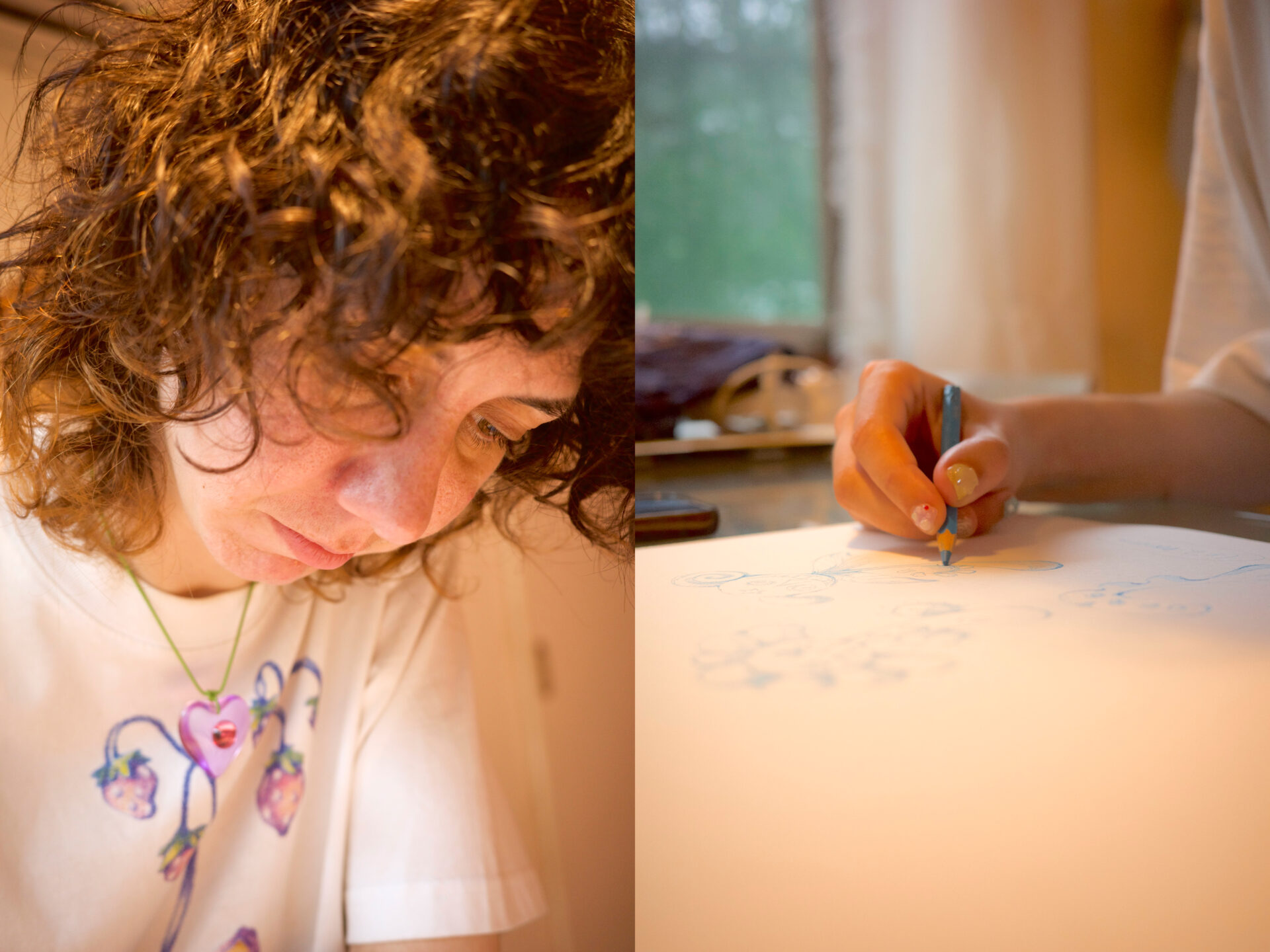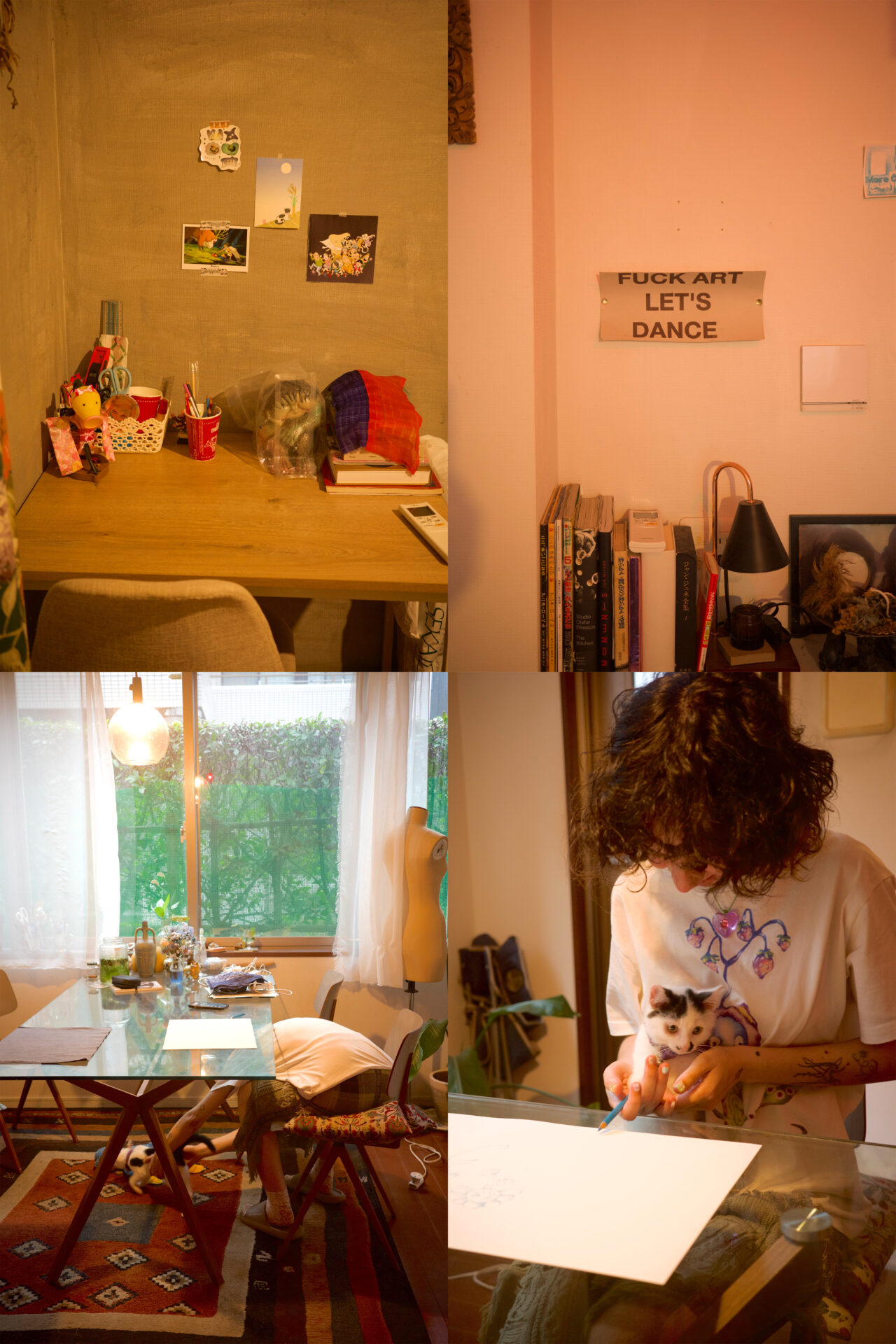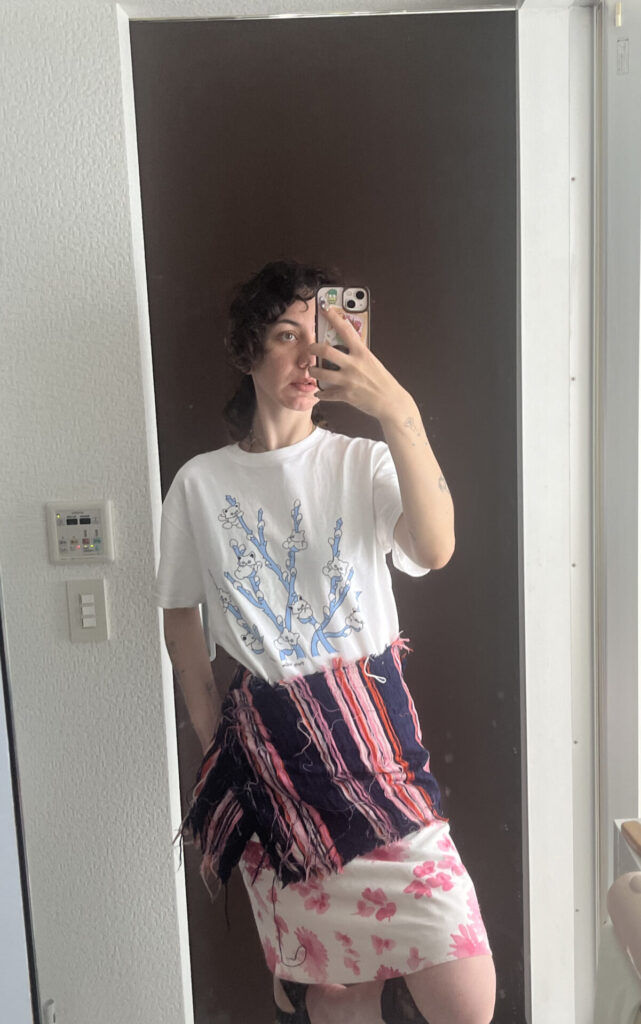WAREHOUSE TRACKSは、世界の様々な人々とワクワクするものを生み出す状況や環境を築くことを目標に掲げています。
これは、そんなコミュニティの輪を作り、広げ、何かを始めてみたい人たちに、実際にそれを始めるきっかけやモチベーションを共有することを目的とした連載です。
第四回目のゲストはEma Gaspar(エマ・ギャスパー)です。
(ヴィジュアル・アーティスト)
At WAREHOUSE TRACKS, we seek to foster an environment where individuals from diverse backgrounds across the globe can come together to create something truly exciting.
This series of articles is aimed to inspire and expand this community, offering both motivation and the opportunity for those wanting to start something of their own to take the first step.
Our 4th guest is Ema Gaspar.
(Visual artist)

幼いころ、両親の家庭問題で心が乱されていた私は、安らぎを求めてお婆ちゃんの家によく遊びに行っていた。そこはポルトガルのリスボン近郊、アルマダという街。人々はその街並みを殺風景と揶揄したけれど、私にとってのアルマダは違った。溢れる自然とお婆ちゃんの家の穏やかな風景が、私の心に美しさを刻んでいた。
お婆ちゃんはクロスステッチが得意で、彼女の家の近くには菜園が広がっていた。大きな木がそびえ、その周りは緑豊かな草木に囲まれていた。放課後、私は毎日その菜園を訪れ、栽培を手伝ったり、昆虫たちと遊びながら物語を紡いで楽しんでいた。そこは私にとって、世界で唯一安心できる場所だった。
When I was a child, my parents’ family problems weighed on me, and I often sought refuge at my grandmother’s house. She lived in Almada, a town near Lisbon, Portugal. Many dismissed Almada as bleak and unremarkable, but to me, it was anything but. The abundance of nature and the quiet charm of my grandmother’s home left a lasting imprint of beauty on my heart.
My grandmother was skilled at cross-stitching, and a vegetable garden thrived near her house. A towering tree stood over it, surrounded by lush greenery. Every day after school, I would visit the garden, tending to the plants while making up stories, with insects as my companions. It was the one place in the world where I felt truly safe.
両親はグラフィック・デザイナーだった。でもその当時、彼らにクリエイティブなことを強要されたことはなかった。私は子供向けアニメ(アニメに限らない)を観ては、菜園での時間の延長のように、自分の好きなキャラクターを想像したり、ストーリーを書き換えたりしていた。そんなあるとき、お婆ちゃんの家に積まれていた白紙を取り出した私は、なんとなくイラストを描き始めた。最初は、描く楽しさに夢中になり、『カードキャプターさくら』などのキャラクターを模写するだけだった。だけど、自分の頭の中で広がる空想や物語が、現実として浮き上がらせることが出来ることに気づくと、私はその瞬間の喜びに魅了されていった。まるで夢が目の前で生き生きと動き出すような感覚。私の頭の中にあるイメージが、ペンの先から紙の上に現れ、私だけの世界を描き出していく。
私は次第にこれに夢中になっていった。その頃に描いていた、擬人化した動物たちが地球を救う漫画は、内気で生きづらさを感じていた私にとって、現実から逃れる手段であると同時に、こんな世界にも自由に表現できる場所があるかもしれないという希望だった。
Both of my parents were graphic designers, but they never pressured me to follow a creative path. Instead, I spent hours watching cartoons and imagining alternate versions of their stories, as if my time in the vegetable garden extended into new worlds of adventure. One day, I found a stack of blank paper at my grandmother’s house and instinctively began to draw. At first, I simply copied characters from Cardcaptor Sakura and other comics, captivated by the sheer joy of the process. But when I realized I could bring the stories in my head to life—transforming my fantasies into something tangible—I was spellbound. It felt as though my dreams had materialized before my eyes, unfolding through the strokes of my pen.
As my passion deepened, I found myself drawing more and more. My early creations—cartoons featuring anthropomorphic animals saving the earth—became both an escape and a form of self-expression. As a shy and introspective child, I struggled to navigate the real world, but through my drawings, I held onto the hope that somewhere out there, I would find a place where I truly belonged.

ポルトガルでは、国家予算の1%未満しか芸術に使われてない。芸術への支援が不足していることが理由で、そもそも美大に行くことやアーティストとして生計を立てる道を選択させてもらえること自体が難しい。豊かな創造性や文化があったとしても、政府からの支援がないことで、才能と情熱を持つ多くの人たちが苦労を強いられているのはとても奇妙な状況だ。そんな現実を考えると、両親がアートの道に進んだ当事者だったおかげで、美大に通うことが許されたことがいかに恵まれているか、感謝の念を抱かずにはいられない。
その後、美大に入り、絵画を学んだ。そのおかげで、表現の選択は増えたし、自分の頭の中のイメージをより詳細に描けるようになった。でももし誰かに「美大に通うことが本当に必要だったのか?」といま尋ねられたら、その答えは曖昧なものになるだろう。学校は私が本当に表現したいことの心の声を聞いてくれなかったし、教授と仲良くなって将来に繋がるコネクションも得られなかった。今の時代、技術を自分で学ぶことは可能で、美大に行けないことを気にするのではなく、自分の表現を実現することにプレッシャーをかけるべきだった。これも美大に通えたからこそ気づけたことではあるけどね。
In Portugal, less than 1% of the national budget is allocated to the arts. This lack of support makes it difficult for people to even consider going to art school, let alone pursue a sustainable career as an artist. It’s a strange contradiction—there is no shortage of creativity or cultural richness, yet many talented and passionate individuals are forced to struggle simply because the system doesn’t support them. Against this backdrop, I can’t help but feel grateful for the opportunity I had to attend art school—something only possible because my parents had already walked the path of the arts themselves.
Thanks to my time in art school, where I studied painting, I gained new tools for expression and learned how to bring more detailed images from my imagination into the real world. But if someone were to ask me now, “Was going to art school really necessary?”—my answer would be uncertain. The school never truly engaged with what I wanted to express, and I struggled to connect with the professors or build relationships that could support my future. In today’s world, where it’s entirely possible to learn techniques on your own, I sometimes think I should have focused more on developing my personal expression. And yet, it was only through that experience that I came to understand this.
美大に通い続け、学び、卒業した。でも私の人生はこれっぽっちも動いていなかった。卒業後はアートと関係ない仕事を探し、結局印刷会社に就職した。9時から17時までの仕事は、エネルギーを消耗するばかりだった。でも、もっと充実したものが絶対にあると信じ、もがき続けた。最終的に上手くいかなかったとしても、少なくとも全力を尽くしたと思えば安心できると信じ、そんな生活から抜け出そうと必死に努力した。さまざまな国のアーティストと集団展を開催したりしていた私は、ようやく印刷会社の仕事を辞め、フリーランスになることを考えていた。そんな矢先に世界中でコロナが蔓延した。私はフリーランスとしてのキャリアに集中し、画力を磨くために日々を過ごした。
I continued with my studies and eventually graduated. But my life didn’t move forward the way I had hoped. After graduation, I found myself working a 9-to-5 job at a printing company—something completely unrelated to art. The routine drained my energy, but I kept going, holding onto the belief that something more fulfilling was out there. Even if I failed in the end, I wanted to be able to say that I had given it my all. So I worked hard to break free from that version of life.
I began organizing group exhibitions with artists from different countries, and eventually, I left the printing company behind. I started to consider a freelance career—just as the COVID-19 pandemic swept across the world. With the world in lockdown, I focused entirely on freelancing, using the time to refine my drawing skills and concentrate on my creative work.

コロナが蔓延しはじめて、ポツポツとSNSに作品を投稿し始めた。最初の頃は、そのすべてが混沌としているSNSを何度も諦めそうになった。でも、世界中の人々が私の作品に感動してくれたことが、私を励ましてくれた。それで少しづつSNSヘの投稿を増やしていき、コラボレーションしたいアートディレクターやクライアントを探して、毎日大量のメールやメッセージを送り続けた。その努力が今の仕事に繋がっている。
インターネットがもたらす素晴らしい点の一つは、誰もが自分の作品を発表し、チャンスをつかむことができるということ。私たちはギャラリーや大企業だけに頼る必要がない時代に生きている。物理的な展示会を開くリソースがなくても、インターネットを利用すれば自分のスペースを無料で作ることも、アートを自由にコントロールすることだってできる。それは、資本主義から自分の作品を取り戻す素晴らしい方法でもある。
As the coronavirus began to spread across the world, I returned to posting my work on social media, starting with small bits and pieces. In the beginning, I almost gave up. The chaotic nature of social media, with its noise and unpredictability, was overwhelming. But when people from around the world responded positively to my work, I felt encouraged. Little by little, I began posting more consistently. I also started sending out countless emails and messages each day, reaching out to art directors and clients I admired. That persistence eventually led to the work I do today.
One of the most empowering aspects of the internet is that anyone can showcase their work and create their own opportunities. We no longer have to rely solely on galleries or large corporations. Even without the resources to host a physical exhibition, it’s possible to build a personal space online—one where you can maintain control over your art. In that way, the internet has also become a powerful tool for reclaiming creativity from the grip of capitalism.
コロナが落ち着き、私はポルトガルを離れ、東京に引っ越した。初めて旅行で東京を訪れたとき、人々やコミュニティ、自然との美しいつながりに心から感動した。その感動が、私を東京に導いた。
日本で過ごした一年間、仕事でもプライベートでもいろんなことがあった。ポルトガルでもがいていたあの頃を振り返ると、私は間違いなく別人のようになり、自分に自信が持てるようになった。
After the pandemic settled down, I left Portugal and moved to Tokyo. When I first visited, I was deeply moved by the sense of connection I felt—with the people, the community, and even the natural world woven into the city. That feeling of belonging and inspiration led me to make the move.
During the year I spent in Japan, a lot changed—both professionally and personally. When I look back on the days when I was struggling in Portugal, I realize how much I’ve grown. I’ve become more confident, more sure of who I am.
I know there will be more changes and challenges ahead. But I want to face them with awareness—of my limits, my values, and my own choices. Most importantly, I want to keep reminding myself: Just give it a try. It’s okay to fail. It’s part of learning. I want to learn when to pause and when to go with the flow. And I want to continue nurturing the beautiful communities and circles of trust that accept me as I am.

これからも私の人生には大きな変化とチャレンジが待っているだろう。それでも、限界を意識しながら、自分のやりたいことを自分で決めていきたい。そして、何よりも「やってみること」を忘れないようにしようと思う。失敗したっていい。それは学びの一環だから。また、どんな時に立ち止まるべきかを学んで、流れに身を任せることも大切にしていきたい。そして、自分を受け入れてくれる、最良のコミュニティと信頼の輪を大切にしていきたい。
Edit,Photo: Yuki Kikuchi
Translate :Kenyu Konishi
I know there will be more changes and challenges ahead. But I want to face them with awareness—of my limits, my values, and my own choices. Most importantly, I want to keep reminding myself: Just give it a try. It’s okay to fail. It’s part of learning. I want to learn when to pause and when to go with the flow. And I want to continue nurturing the beautiful communities and circles of trust that accept me as I am.
Edit,Photo: Yuki Kikuchi
Translate: Kenyu Konishi

